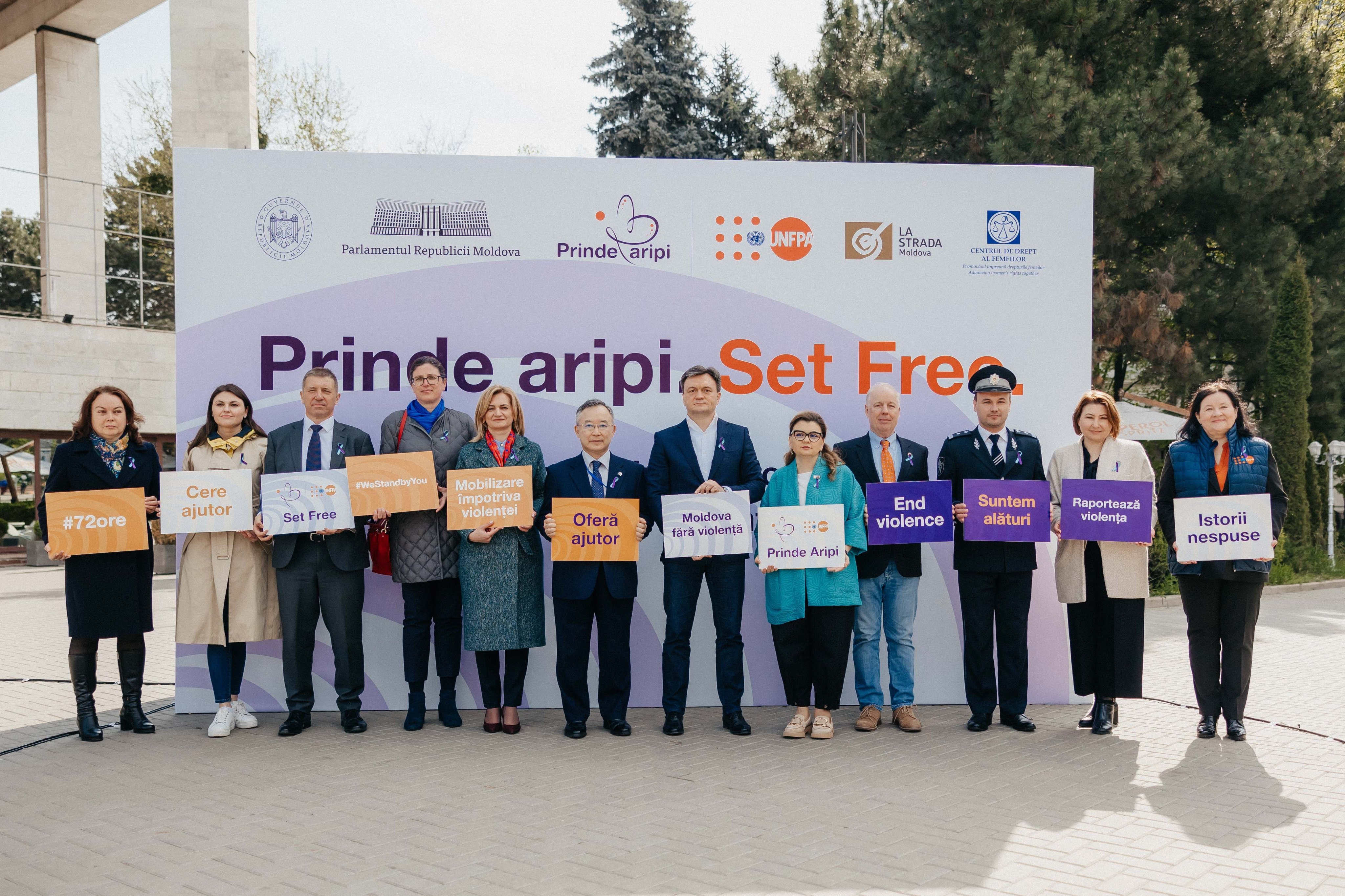About the campaign

More than 100 participants, including the Prime Minister of the Republic of Moldova Dorin Recean, President of the Parliamentary Committee for Foreign Policy and European Integration Doina Gherman, Ambassador of the United Kingdom H.E. Steven Fisher, Ambassador of the United States of America H.E. S. Kent D. Logsdon, Ambassador of Japan H.E. Yamada Yoichiro and Ambassador of Sweden H.E. Katarina Fried, civil society organizations and service providers joined UNFPA in the launch of the campaign.
Why is #SetFree campaign important?
Sexual violence has a ripple effect that extends beyond the individual survivor and affects families, communities, and society at large. Despite ongoing efforts to prevent and address sexual violence, it remains a pervasive issue that occurs at alarming rates worldwide. Survivors of sexual violence often face stigma, shame, and a lack of support, making it difficult for them to access the necessary resources and services they need to heal and recover.
Although gender-based violence is under-reported, under-recorded and difficult to measure in terms of its economic and health impact, there is evidence that suggests that the effects of gender-based violence (GBV) on our society are enormous. GBV can have severe long-term consequences for the physical and mental health of victims/survivors, sometimes leading to child neglect and/or posttraumatic stress disorder.
Refugees and people on the move are particularly vulnerable to gender-based violence, including sexual violence. The displacement caused by the war disrupted social support networks and led to a breakdown of community protection systems, leaving women and girls at increased risk of violence, exploitation, and abuse. In Moldova, the recent influx of refugees from Ukraine has resulted in a significant increase in the number of women and girls who are at risk of GBV, particularly sexual violence.
It is important to note that girls and women bear the brunt of violations. A global study from UNFPA reveals that girls and young women with disabilities face up to 10 times more gender-based violence than those without disabilities. Girls with intellectual disabilities are particularly vulnerable to sexual violence.
What does UNFPA do?
In response to this, UNFPA has partnered with the government and local organizations to provide refugees with access to life-saving care to stay healthy and safe. UNFPA is addressing GBV prevention and response, particularly sexual violence, by strengthening the healthcare system's response. Furthermore, UNFPA supports Safe Spaces across Moldova, which provide protection, referrals to specialized services for survivors of GBV, and access to information on GBV and SRH, individual and group counseling, and social activities.
The health sector plays a critical role in addressing sexual violence, particularly for women and girls who are at a higher risk of GBV during displacement. In Moldova, UNFPA is working to strengthen the healthcare and social system's response to gender- based violence.
The UNFPA Moldova office has made significant strides in improving the clinical management of rape cases in the country, including the development and approval of a National Clinical Protocol, building a network of healthcare professionals and launching a Hotline for service-providers, delivering the post-rape kits to hospitals, equipping the emergency gynecological units, and training the multidisciplinary teams to ensure effective coordination and comprehensive support services.



A National Clinical Protocol for the clinical management of rape cases was developed and approved in September 2021, and training sessions were held for doctors of various specialties to ensure its implementation. Post-rape kits were also provided to hospitals in the country, containing medication for the prophylactic treatment of rape survivors. UNFPA is working to equip hospital institutions in the country with 42 offices for gynecological emergencies to assist rape survivors.
By promoting the health sector's role as an entry point for survivors to seek holistic support, we aim to increase survivors' access to comprehensive care and support services, ultimately contributing to their healing and recovery.
Shattering a myth: What Were You Wearing Art Exhibit
A school uniform. A pair of pajamas. Work slacks and a blouse. These are just some of the clothes that women and girls in Moldova were wearing when they were sexually assaulted, abused, or harassed.
As part of the UNFPA Set Free campaign, this exhibit features ten stories of women and girls from Moldova, and a refugee fleeing from the war in neighboring Ukraine.
The survivors of rape and sexual assault shared their stories through symbolic representation of the clothes they wore during the attacks.
In Moldova, every second woman was a survivor of gender-based violence, and the sexual violence remains underreported because of stereotypes, stigma, and fear.
Collective victim-blaming myth is prevalent in Moldova and around the world, where survivors who have the courage to report are unjustly asked “What were you wearing?”
It is time to end the blaming and stand up for bodily autonomy, rights, and dignity of survivors of violence. Join the conversation.


